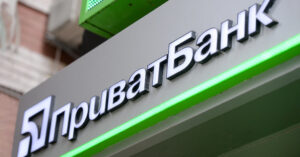
On Friday, October 31, from 9:30 a.m. to 1:00 p.m., AmCham Ukraine, together with our member company Sayenko Kharenko, invites you to join us for Halloween Blood Donor Day. Details of the location will be sent to registered participants the day before the event. The venue has shelter.
Join us (costumes are welcome but not required) and be part of a life-saving mission. Every drop of blood can help save up to three lives—after all, real heroes don’t need capes, just courage and compassion.
The event is open to everyone, so invite your friends, colleagues, and loved ones. Choose a convenient time and register in advance via DonorUA.
Let’s make this Halloween terrifyingly good and life-giving!
Follow all rules and recommendations to prepare for blood donation.
Don’t forget to bring your passport and Ukrainian citizen identification code. Citizens of other countries can also be donors if they have a residence permit in Ukraine and an identity document.

Federal Minister for Economic Affairs Katerina Reiche has promised Ukraine additional aid in the amount of €30 million for the energy sector, and this amount may still be increased, Tagesspiegel reported on Friday.
During her visit to Kyiv, Reiche told reporters that in early October, about 60% of Ukraine’s gas supply had been destroyed by Russian attacks.
“Russia’s goal is obviously to exhaust Ukraine. We will help restore the energy infrastructure,” she said.
Germany has already allocated a third of the total amount of EUR 390 million to the Energy Assistance Fund for Ukraine, and has promised to invest another EUR 30 million in Ukraine, with the possibility of further increases.
As reported, Reiche arrived in Kyiv on Friday to assess Ukraine’s needs for rebuilding its energy infrastructure after large-scale Russian attacks that severely damaged the power grid, Reuters reports. In addition to rebuilding the energy infrastructure, Reiche intends to focus on expanding German-Ukrainian defense cooperation.

Which regions became tourist centers?
According to the State Tax Service, UAH 91.7 million in tourist tax was paid to local budgets from July to September 2025.
In total, businesses paid UAH 234.4 million in tourist tax over the first nine months of 2025. This is 1.5 times more than during the same period before the start of the full-scale war. Kyiv, Lviv, and Ivano-Frankivsk regions remain the largest contributors to local budgets.
Local budgets received UAH 234.4 million in tourist tax for the first nine months of 2025. This is 36% more than in the same period last year and 1.5 times more than before the start of the full-scale war.
The summer season is traditionally the “golden time” for the tourism industry. Businesses paid 91.7 million hryvnia in tourist tax from July to September 2025. This is 20% more than in the second quarter of this year — 76.2 million hryvnia.
More than half of the tourist tax — 53% or UAH 125.2 million — was paid by large businesses: hotels, sanatoriums, and recreation centers. The remaining 47% or UAH 109.2 million was paid by small businesses, i.e., owners of apartments, estates, and small tourist facilities. It is worth noting that revenues from small businesses increased by 39%, while those from large businesses increased by only 6.5% during this period.
The capital remains the undisputed leader of Ukrainian tourism. A fifth, or UAH 51 million, of the tourist tax was paid in Kyiv. 81% of this amount came from large businesses.
Lviv region is in second place with UAH 42.5 million — here the share of large businesses is smaller, 56%. Ivano-Frankivsk region closes the top three — UAH 32.5 million, while 55% of the tourist tax in the region was paid by small businesses.
The amount of tourist tax collected in the Odesa region increased the most during the holiday season. Despite this, the region’s figures for the first nine months are still 17% lower than for the same period in 2021.
Compared to the pre-war period, the amount of tourist tax collected in Bukovina increased fivefold. At the same time, 90% of the amount was provided by owners of apartments, estates, and small tourist facilities. Ivano-Frankivsk region is also among the leaders: the amount of tourist tax for this period increased 4.5 times.

The international financial service NovaPay (TM NovaPay) raised the rate on short-term deposits from private investors by 1-2 percentage points (pp) — from 1 to 3 months, and by 0.25-0.5 p.p. for deposits with a term of 4 to 9 months, according to the company’s press release on Thursday.
It is noted that the current rates as of October 23, 2025, are: 1 month — 12%; 2 months — 14%; 3 months — 15.5%; 4 months — 17%; 6 months — 17.5%; and 9 months — 17.75%.
In July, NovaPay offered 10% per annum for 1 month, 12% for 2 months, 14.5% for 3 months, 16.5% for 4 months, and 17.5% for 6 and 9 months.
The company clarified that the rate for annual deposits remained unchanged at 18%.
Since the beginning of March 2025, the National Bank has held the discount rate at 15.5% for five consecutive meetings, and before that, it increased it three times since mid-December 2024. Earlier, it had kept it at 13% for six months, to which it had been reduced from 25% in July 2023 in seven stages.
According to NovaPay CFO Igor Prykhodko, most clients invest in short and medium terms.
As reported, NovaPay launched an alternative to deposits through repo transactions with bonds of its subsidiary NovaPay Credit. They are available for purchase in the NovaPay mobile app. As of July this year, the company reported attracting UAH 1.7 billion through this mechanism.
NovaPay was founded in 2001 as an international financial service, part of the Nova group (“Nova Poshta”), providing online and offline financial services in Nova Poshta branches. According to the website, the company employs about 13,000 people in more than 3,600 Nova Poshta branches throughout Ukraine. According to the National Bank of Ukraine, the company accounts for about 35% of the total volume of domestic money transfers.
NovaPay was the first non-bank financial institution in Ukraine to receive an extended license from the NBU in 2023, which allowed it to open accounts and issue cards, and was also the first among non-banks to launch its own financial application with a wide range of financial services at the end of last year.
According to the bond prospectus, NovaPay Credit plans to increase its interest income to UAH 802.1 million this year and to UAH 1 billion 515.1 million next year, and to receive UAH 518.9 million and UAH 1 billion 30.6 million in net profit, respectively.
Last year, the company’s net profit grew to UAH 89.2 million from UAH 40.3 million a year earlier, with revenue growing to UAH 285.6 million from UAH 95.6 million.

According to the results for January-September this year, state-owned PrivatBank received UAH 50.6 billion in net profit, which is 5% or UAH 2.2 billion more than in January-September last year, according to a press release from the bank on Thursday.
“Business results without revaluations, loan risk reserves, and taxes reached UAH 62.6 billion, an increase of 15% (UAH 8.2 billion) compared to the same period in 2024,” the financial institution said.
According to the bank, it ranks first in the market in terms of profitability, generating more than 43.5% of the banking sector’s pre-tax profit. It is noted that this demonstrates the stability of the chosen business model and the growth of operational efficiency despite external challenges.
According to the release, since the beginning of the year, the bank’s net loan portfolio has grown by UAH 30 billion (+27%), reaching UAH 143 billion as of September 30, 2025. According to its data, PrivatBank ranks first in Ukraine in terms of loan portfolio volume, covering almost 15% of the market. At the same time, the market share of loans to individuals is almost 35%.
During the first nine months of 2025, funds in individual customer accounts increased by UAH 59 billion in equivalent terms (+13%), reaching UAH 505 billion, thanks to which PrivatBank, with a market share of 22.9%, is also the leader in terms of deposits from both legal entities and individuals.
“The basis for the bank’s successful financial results is stable and growing net interest (+19%) and commission (+5%) income compared to the first nine months of 2024,” the release says.
The cost-to-income ratio (CIR) is 24.07%, while the average for all banks is 41.77%.
As of October 2025, PrivatBank’s active customer base was 18.1 million individuals, which is 220,000 fewer than at the end of 2024. On the other hand, the number of business clients increased by 20,000 to 930,000 during this period, while the number of users of the Privat24 mobile app decreased by 150,000 to 13.61 million.
According to NBU statistics, as of October 1, 2025, PrivatBank had 1,096 branches, compared to 1,113 on the same date last year.
The bank’s infrastructure includes 7,100 ATMs and 10,300 self-service terminals. As of October 2025, PrivatBank had over 341,000 POS terminals.
According to the NBU, PrivatBank’s total assets reached UAH 1.001 trillion as of September 1, 2025, or 25.6% of the total assets of the Ukrainian banking system.